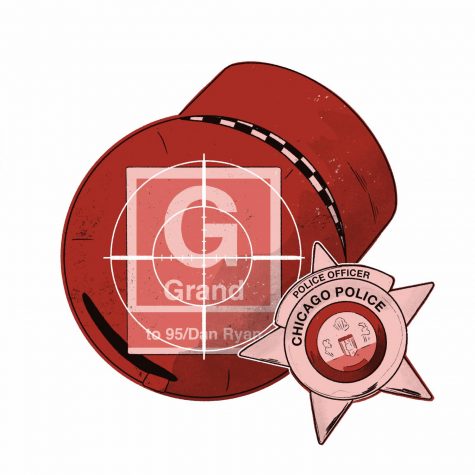Opinion: Police sanctioned violence on CTA
March 7, 2020

Gun violence in Chicago doesn’t only exist in a few sectioned-off neighborhoods, it doesn’t just happen in dark, tucked-away alleys or between citizens whose names will soon become part of the endless, reeling list of people who have succumbed to this madness.
Gun violence can be, and often is, police violence—happening in broad daylight, disrupting communities from the outskirts of the city to the heart of it.
On Friday, Feb. 28, at the Grand station on the Chicago Transit Authority Red Line, two police officers attempted to handcuff and arrest a man who was moving between train cars. When the man resisted, he was pepper sprayed, tased and shot by an officer after another officer yelled, “Shoot him!”
The incident was caught on camera by another CTA passenger and immediately went viral, causing Mayor Lori Lightfoot to release a statement.
In a tweet that same evening, Lightfoot stated “… the video is extremely disturbing and the actions by these officers are deeply concerning.” Both officers have been stripped of their police powers, as reported Wednesday, March 4 by the Associated Press.
I have viewed the widely shared footage depicting the police-involved shooting at the CTA station. With the strong caveat that one perspective does not depict the entirety of the incident, the video is extremely disturbing and the actions by these officers are deeply concerning.
— Archived: Mayor Lori E. Lightfoot (@mayorlightfoot) February 29, 2020
Our elected officials should cut deeper than being “deeply concerned” when those who bear the police badge use their lethal weapons so flippantly. Gun violence is hard to justify—it becomes increasingly more difficult when sound reasoning for these actions is nearly nonexistent.
If you’ve ever ridden the CTA, there is a very good chance you’ve seen a passenger cross between train cars. Maybe you’ve even done it yourself. Is it safe? Not necessarily. Is it recommended? No. Should it be deemed illegal and punishable by law? No.
According to City Ordinance No. 016-110, crossing between train cars is prohibited on the CTA. The consequences one can face, depending on which rule they are in violation of, can result in removal, a period of supervision, a fine or community service. Interestingly enough, being tasered and then shot by a CPD Mass Transit officer does not fit the consequential criteria outlined by this ordinance.
These actions are trivial in the grand scheme of punishable crimes here in the city. Passing between cars on a train is on the same scale as jaywalking, littering or sleeping on a public bench. Should the next police officer on the corner, outside a convenience store or in the park take it upon themselves to fire a weapon when they witness these “crimes” and the perpetrators resist arrest?
This is not to say that crimes should go unpunished. But it is to say citizens of Chicago should be able to trust that police officers will assess situations and use the proper, necessary action if and only when it is for the cause of justice.
In this police state we live in, officers’ knee-jerk reactions of aggression and the use of any weapon on their person is damaging to both the people afflicted by it and possibly passersby. It skews the lines between right and wrong, safety and danger—and perpetuates the aura of violence that shrouds the CPD.
It is more than mind-boggling or disheartening that actions as frivolous as switching train cars via emergency exit will result in gunfire, hospital visits and legal charges—which were dropped by the CPD, though they were hardly sound in the first place.
It is bone-chilling when we consider the recent surge of Mass Transit officers assigned to patrol the CTA in order to prevent violence, only to see that they are, in fact, the ones manufacturing it.
While their presence may serve as a comfort to the powers that be in Chicago—resting their heads at night thinking they have serviced their citizens in a new way via police “protection”—it also serves as a nightmare for other citizens who interact with trigger-happy officers who prefer escalation over peace and protection.







